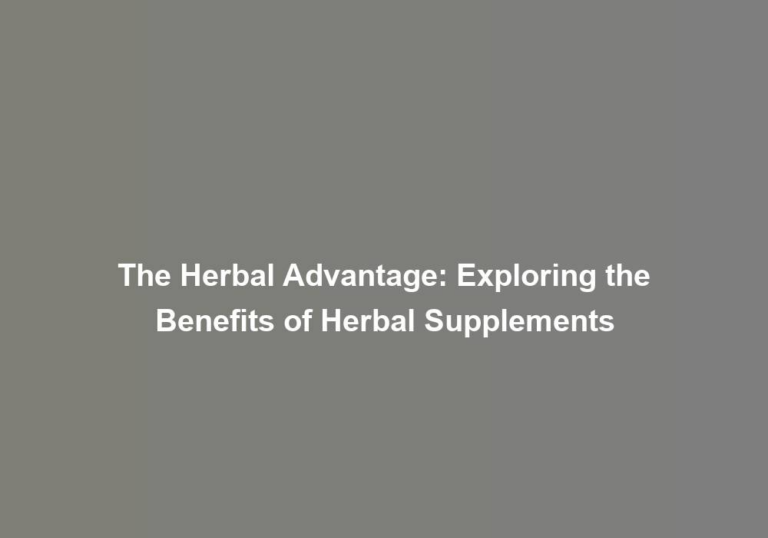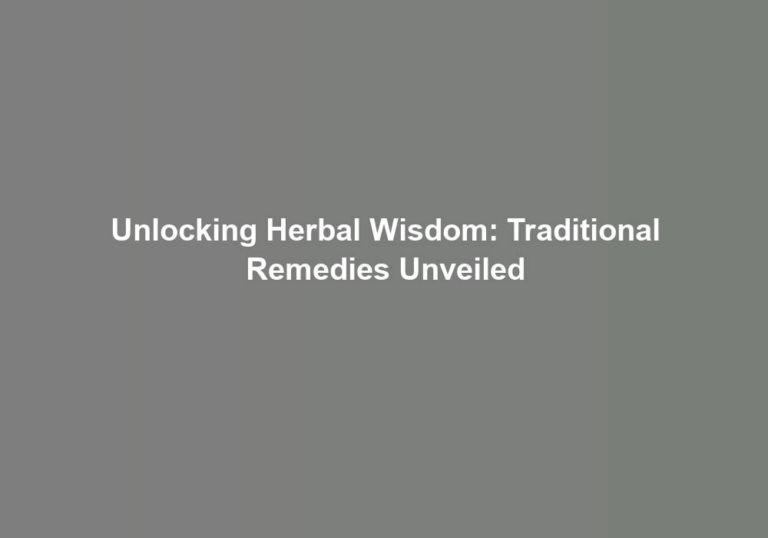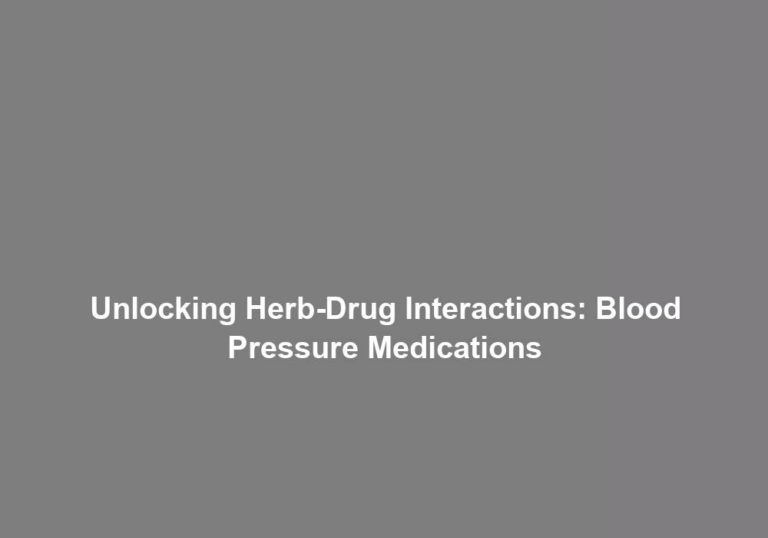Safety and Regulation of Herbal Supplements: Your Guide
You may not be aware that herbal supplements are not as strictly regulated as prescription medications. With an increasing number of people turning to natural remedies, itG??s important to understand the safety and regulation of herbal supplements to make informed choices about your health. As you navigate the vast array of herbal supplements available, itG??s crucial to be aware of potential risks, quality control measures, and how these products are regulated. Understanding these factors will empower you to make responsible decisions when it comes to incorporating herbal supplements into your wellness routine.
Risks and Benefits of Herbal Supplements
When considering the risks and benefits of herbal supplements, itG??s essential to approach the topic with a critical and discerning mindset. Herbal supplements, while often perceived as natural and therefore safe, can have potential interactions with prescription medications. ItG??s crucial to consult with a healthcare professional before adding herbal supplements to your regimen, especially if you are taking other medications. Evidence-based research on herbal supplements is still limited in many cases, making it important to be cautious and well-informed.
One of the key considerations when evaluating the risks and benefits of herbal supplements is the potential for interactions with other medications. Certain herbal supplements may interfere with the effectiveness of prescription drugs or exacerbate their side effects. For example, St.-?JohnG??s Wort, a popular herbal supplement, can interact with antidepressants, birth control pills, and blood thinners. This underscores the importance of understanding how herbal supplements may interact with any current medications you are taking.
Furthermore, evidence-based research on the efficacy and safety of herbal supplements is an ongoing area of study. While some supplements have been extensively researched, others lack substantial scientific backing. ItG??s important to seek out reputable sources of information and to critically evaluate the available evidence before incorporating herbal supplements into your routine. By staying informed and being mindful of potential interactions, you can make well-informed decisions about the risks and benefits of herbal supplements.
Understanding Herbal Supplement Regulation
As you consider the potential interactions and limited research surrounding herbal supplements, it is crucial to understand the regulatory framework that governs these products. Herbal supplements are regulated by various government agencies to ensure their safety, quality, and effectiveness. Understanding these regulations can help you make informed choices when using herbal supplements. HereG??s a breakdown of the regulatory agencies and labeling requirements that you should be aware of:
| Regulatory Agencies | Labeling Requirements |
|---|---|
| FDA (Food and Drug Administration) | – Must include the name and address of the manufacturer, packer, or distributor – Product must be labeled as a dietary supplement – Cannot claim to cure, prevent, or treat diseases |
| FTC (Federal Trade Commission) | – Prohibits false or misleading claims on product labels – Requires substantiation for health claims |
| USDA (United States Department of Agriculture) | – Oversees organic certification for herbal supplements |
| NCCIH (National Center for Complementary and Integrative Health) | – Provides research-based information on herbal supplements |
These regulatory agencies work to ensure that herbal supplements meet certain standards for safety and quality. By understanding the labeling requirements, you can assess the information provided on the product and make informed decisions about its use. Keep in mind that while these regulations are in place, itG??s still important to consult with a healthcare professional before starting any new herbal supplement, especially if you have existing health conditions or are taking other medications.
Safety Considerations for Herbal Supplements
Are there specific safety considerations you should keep in mind when using herbal supplements? Absolutely. When it comes to herbal supplements, itG??s crucial to be aware of potential interactions with other medications or supplements you may be taking. Some herbs can interact with prescription medications or over-the-counter drugs, altering their effects or causing adverse reactions. Always consult with a healthcare professional before starting any new herbal supplement to ensure it is safe to use alongside your current medications.
In addition to potential interactions, understanding proper dosages is essential for ensuring the safety of herbal supplements. While natural, herbal supplements can still have potent effects, and taking too much can lead to adverse reactions. ItG??s important to follow the recommended dosage instructions provided on the supplement packaging or as advised by a healthcare professional. Never exceed the recommended dosage unless instructed to do so by a qualified healthcare provider.
Furthermore, if you are pregnant, nursing, or have a pre-existing medical condition, itG??s crucial to exercise extra caution when considering herbal supplements. Certain herbs may not be safe for use during pregnancy or while breastfeeding, and some may exacerbate existing health issues. Always seek guidance from a healthcare professional to determine which herbal supplements are safe for you based on your individual circumstances.
Quality Control Measures for Herbal Supplements
To ensure the quality and safety of herbal supplements, it is imperative to understand the measures implemented for their production and distribution. Herbal supplement testing and manufacturing standards play a crucial role in ensuring that the products meet the required quality and safety criteria. Here are some key quality control measures for herbal supplements:
| Quality Control Measures | Description |
|---|---|
| Ingredient Testing | All herbal ingredients should undergo rigorous testing for purity and potency. |
| Contaminant Screening | Herbal supplements must be screened for contaminants such as heavy metals and toxins. |
| Good Manufacturing Practices | Adherence to GMP ensures that herbal supplements are consistently produced and controlled to the quality standards appropriate for their intended use. |
| Product Labeling | Proper labeling ensures accurate information about the herbal supplementG??s contents, serving size, and usage instructions. |
| Stability Testing | Stability testing assesses the shelf life and ensures the herbal supplements remain effective throughout their recommended use-by date. |
These measures are essential for maintaining the integrity and safety of herbal supplements. By adhering to strict quality control measures, manufacturers can produce reliable and effective products, providing consumers with the assurance of safety and quality. As a consumer, it is important to choose herbal supplements from reputable brands that prioritize quality control and adhere to manufacturing standards. This ensures that you receive products that meet high-quality standards and are safe for consumption.
Navigating the Herbal Supplement Market
Navigating the herbal supplement market requires a keen awareness of the quality control measures that ensure the safety and integrity of the products. Consumer education plays a crucial role in this process. Understanding how to read and interpret product labels empowers you to make informed decisions about the supplements you purchase. Look for clear and accurate information about the ingredients, dosage, and potential allergens. Additionally, market transparency is essential. Seek out brands that openly share their product testing and quality assurance processes. Trustworthy companies often conduct third-party testing to verify the purity and potency of their supplements. This information should be readily available to consumers, either on the product packaging or the companyG??s website.
When navigating the herbal supplement market, itG??s important to prioritize product testing. Reliable brands invest in rigorous testing to ensure their products are free from contaminants and meet quality standards. Look for supplements that have been tested for authenticity, purity, and potency. This commitment to thorough testing demonstrates a brandG??s dedication to providing safe and effective products.
Conclusion
In conclusion, when considering the safety and regulation of herbal supplements, itG??s important to weigh the risks and benefits. Understanding the regulation and safety considerations, as well as quality control measures, is crucial for navigating the herbal supplement market. By staying informed and making mindful choices, you can confidently incorporate herbal supplements into your wellness routine. Remember, being detail-oriented and compliant ensures you make analytical decisions for your health. Stay savvy, stay safe with herbal supplements.







